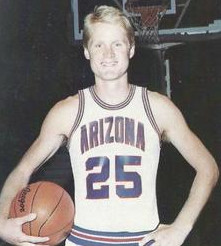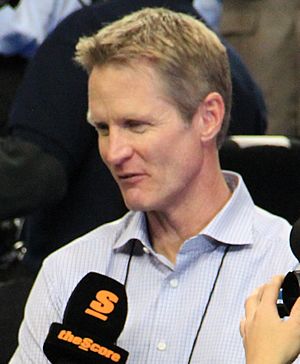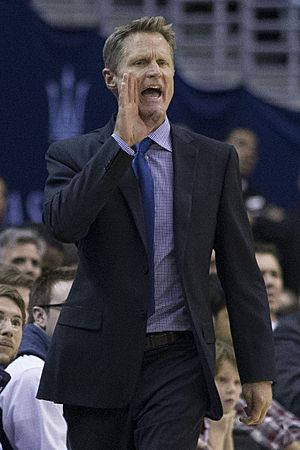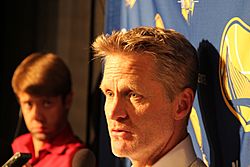Steve Kerr facts for kids
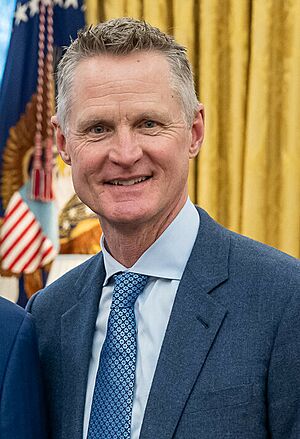
Kerr in 2023
|
||||||||||||||||||||||||||||||||
| Golden State Warriors | ||||||||||||||||||||||||||||||||
|---|---|---|---|---|---|---|---|---|---|---|---|---|---|---|---|---|---|---|---|---|---|---|---|---|---|---|---|---|---|---|---|---|
| Head coach | ||||||||||||||||||||||||||||||||
| Personal information | ||||||||||||||||||||||||||||||||
| Born | September 27, 1965 Beirut, Lebanon |
|||||||||||||||||||||||||||||||
| Nationality | American | |||||||||||||||||||||||||||||||
| High school | Palisades (Pacific Palisades, California) |
|||||||||||||||||||||||||||||||
| Listed height | 6 ft 1 in (1.85 m) | |||||||||||||||||||||||||||||||
| Listed weight | 180 lb (82 kg) | |||||||||||||||||||||||||||||||
| Career information | ||||||||||||||||||||||||||||||||
| College | Arizona (1983–1988) | |||||||||||||||||||||||||||||||
| NBA Draft | 1988 / Round: 2 / Pick: 50th overall | |||||||||||||||||||||||||||||||
| Selected by the Phoenix Suns | ||||||||||||||||||||||||||||||||
| Pro career | 1988–2003 | |||||||||||||||||||||||||||||||
| Coaching career | 2014–present | |||||||||||||||||||||||||||||||
| League | NBA | |||||||||||||||||||||||||||||||
| Career history | ||||||||||||||||||||||||||||||||
| As player: | ||||||||||||||||||||||||||||||||
| 1988–1989 | Phoenix Suns | |||||||||||||||||||||||||||||||
| 1989–1992 | Cleveland Cavaliers | |||||||||||||||||||||||||||||||
| 1992–1993 | Orlando Magic | |||||||||||||||||||||||||||||||
| 1993–1998 | Chicago Bulls | |||||||||||||||||||||||||||||||
| 1999–2001 | San Antonio Spurs | |||||||||||||||||||||||||||||||
| 2001–2002 | Portland Trail Blazers | |||||||||||||||||||||||||||||||
| 2002–2003 | San Antonio Spurs | |||||||||||||||||||||||||||||||
| As coach: | ||||||||||||||||||||||||||||||||
| 2014–present | Golden State Warriors | |||||||||||||||||||||||||||||||
| Career highlights and awards | ||||||||||||||||||||||||||||||||
|
||||||||||||||||||||||||||||||||
| Career NBA statistics | ||||||||||||||||||||||||||||||||
| Points | 5,437 (6.0 ppg) | |||||||||||||||||||||||||||||||
| Rebounds | 1,060 (1.2 rpg) | |||||||||||||||||||||||||||||||
| Assists | 1,658 (1.8 apg) | |||||||||||||||||||||||||||||||
|
Medals
|
||||||||||||||||||||||||||||||||
Stephen Douglas Kerr (born September 27, 1965) is an American professional basketball coach and former player. He is currently the head coach for the Golden State Warriors in the National Basketball Association (NBA). He also coaches the U.S. national team.
Kerr is known as one of the best three-point shooters in NBA history. He holds the record for the highest career three-point percentage. Steve Kerr is a nine-time NBA champion. He won five titles as a player and four as a head coach. He was also named one of the 15 Greatest Coaches in NBA History.
Kerr played college basketball for the Arizona Wildcats. He was a top player in the Pac-10 conference. He also earned All-American honors in 1988. In the 1987–88 season, Kerr set an NCAA record. He made 57.3% of his three-point shots.
The Phoenix Suns picked Kerr in the 1988 NBA draft. He played 15 seasons in the NBA. He won five NBA championships as a player. Three were with the Chicago Bulls and two with the San Antonio Spurs. He retired with the best career three-point shooting percentage in NBA history.
After playing, Kerr became a part-owner of the Phoenix Suns in 2004. In 2007, he became the team's president of basketball operations and general manager. He left this role in 2010. After that, Kerr worked as a TV commentator for NBA on TNT until 2014.
In May 2014, Kerr became the head coach of the Golden State Warriors. Under his leadership, the team became very successful. They reached the NBA Finals six times. They won four championships in 2015, 2017, 2018, and 2022. The 2015–16 Warriors won 73 games. This broke the record for the most wins in an NBA season.
Early Life and International Play
Kerr was born in Beirut, Lebanon, on September 27, 1965. His parents, Malcolm and Ann Kerr, were American academics. They both studied the Middle East. Steve has three siblings. His grandfather, Stanley Kerr, helped rescue orphans after the Armenian genocide. He later settled in Beirut.
Kerr spent much of his childhood in Lebanon and other Middle Eastern countries. In 1983, he met U.S. Marines in Beirut. Some of them were later killed in the 1983 Beirut barracks bombings. Kerr graduated from Palisades High School in Los Angeles in 1983.
On January 18, 1984, his father, Malcolm Kerr, was killed. He was serving as president of the American University of Beirut. He was shot by members of the Islamic Jihad. Steve was 18 and a college freshman at the time. He later said, "Before my father was killed, my life was impenetrable. Bad things happened to other people."
In 1986, Kerr joined the U.S. national team. They played in the FIBA World Championship in Spain. The team won the title. This was the first time since 1954. It was also the last American men's team without NBA players to win a major international tournament. Kerr hurt his knee during this competition.
College Basketball Career
Kerr played basketball at the University of Arizona from 1983 to 1988. He was a guard. He missed the 1986–87 season because of his knee injury.
In 1988, during a game against rival Arizona State University, fans tried to upset Kerr. They shouted things about his father. Even though he was emotional, Kerr led his team to victory. He scored 20 points in the first half. He made all six of his three-point shots. Arizona State's athletic director later apologized to Kerr.
With his teammate Sean Elliott, Kerr helped the Wildcats reach the Final Four in the 1988 NCAA tournament. He was a two-time first-team All-Pac-10 player. He also set an NCAA record for three-point percentage (57.3%) in 1987–88.
Kerr graduated from the University of Arizona in 1988. He studied history, sociology, and English. He finished his college career averaging 11.2 points per game.
Professional Playing Career
Phoenix Suns (1988–1989)
The Phoenix Suns drafted Kerr in 1988. He was the 50th player chosen overall. In his first season, Kerr averaged 2.6 points per game.
Cleveland Cavaliers (1989–1992)
In 1989, Kerr was traded to the Cleveland Cavaliers. He played more than three seasons there. He set team records for single-season (50.7% in 1989–90) and career three-point percentage (47.2%).
Orlando Magic (1992–1993)
In December 1992, Kerr was traded to the Orlando Magic. He averaged 2.6 points per game with Orlando.
Chicago Bulls (1993–1998)
In 1993, Kerr joined the Chicago Bulls. He played five seasons for the Bulls. He usually came off the bench as a three-point specialist. The Bulls made the playoffs in 1994 and 1995. But without Michael Jordan for much of that time, they didn't reach the Finals.
With Jordan back for the 1995–96 season, the Bulls set an NBA record. They won 72 games and lost only 10. They then beat the Seattle SuperSonics in the 1996 NBA Finals.
In 1997, the Bulls had a 69–13 record. They reached the 1997 NBA Finals against the Utah Jazz. In Game 6, the score was tied at 86. Kerr took a pass from Jordan and made a shot to win the championship for the Bulls. Kerr also won the Three-Point Contest at the 1997 NBA All-Star Weekend.
In Game 2 of the 1998 NBA Finals against Utah, Kerr missed a three-pointer. He got his own rebound and passed to Jordan. Jordan made a key play, giving the Bulls the lead. The Bulls went on to win the series in six games.
Kerr set Bulls records for single-season (52.4% in 1994–95) and career three-point percentage (47.9%). He averaged 8.2 points per game with the Bulls.
San Antonio Spurs (1999–2001)
In January 1999, Kerr joined the San Antonio Spurs. The Spurs reached the 1999 NBA Finals and won their first NBA Championship. They beat the New York Knicks 4–1. Kerr and Frank Saul were the only players to win three championships with two different teams in a row. This changed when Patrick McCaw did it in 2019.
Portland Trail Blazers (2001–2002)
On July 24, 2001, Kerr was traded to the Portland Trail Blazers. He played 65 games in the 2001–02 season. He averaged 4.1 points per game.
Return to San Antonio (2002–2003)
On August 2, 2002, Kerr was traded back to San Antonio. This was his final season playing in the league. In Game 6 of the 2003 Western Conference Finals, Kerr made four three-pointers. These helped the Spurs win and beat the Dallas Mavericks. The Spurs then won the NBA championship. They beat the New Jersey Nets in the 2003 NBA Finals.
Retirement
Kerr retired after the 2003 NBA Finals. He won five NBA championships as a player. He retired with the highest career three-point shooting percentage in the league (45.4%). As of 2024, Kerr is the only NBA player to win four straight NBA titles after 1969.
Broadcasting and Commentary Career
In 2003, Kerr became a TV analyst for Turner Network Television (TNT). He provided commentary during NBA games. He also had a segment called Steve's Refreshing Thoughts. In this segment, he shared interesting facts about NBA history.
Kerr left broadcasting in 2007 to work for the Phoenix Suns. He returned to TNT as an NBA analyst for the 2010–11 NBA season. In 2011, he also covered the NCAA Men's Division I Basketball Championship for Turner Sports and CBS.
Executive Career with Phoenix Suns (2004–2010)
On April 15, 2004, Kerr joined a group buying the Phoenix Suns. He became a consultant for the team's management. In 2007, Kerr became the general manager of the Phoenix Suns.
In 2008, the Suns traded for Shaquille O'Neal. The Suns were eliminated from the playoffs by the San Antonio Spurs. Kerr continued to change the Suns' roster. In 2010, Kerr left the Suns as president of basketball operations and general manager. He owned a small part of the team until 2014.
Coaching Career
Golden State Warriors (2014–present)
2014–15 Season: A New Dynasty Begins
On May 14, 2014, Kerr became the head coach for the Golden State Warriors. He signed a five-year deal. In the 2014–15 season, his team used a mix of different playing styles.
Kerr became the first coach to start his career with a 19–2 record. He also became the first rookie head coach to win 21 of his first 23 games. He was named the head coach for the Western Conference team in the 2015 NBA All-Star Game. On April 4, the Warriors won their 63rd game. This made Kerr the winningest rookie head coach in NBA history.
The Warriors had one of the best regular seasons ever. They finished with a 67–15 record. Point guard Stephen Curry won his first of two MVP awards. The Warriors also had a 39–2 home record. This is one of the best home records in NBA history.
In the playoffs, Kerr led the Warriors to their first four-game sweep since 1975. They beat the New Orleans Pelicans. Then, they defeated the Memphis Grizzlies (4–2). Kerr made a smart change in Game 4. He had his center, Andrew Bogut, guard the inside. This left Memphis's Tony Allen open. Allen was a good defender but not a good shooter. This strategy worked well.
The Warriors then beat the Houston Rockets (4–1). They reached the NBA Finals for the first time in 40 years. They faced the Cleveland Cavaliers. Kerr and the Cavaliers coach were both in their first season. This was the first time two rookie head coaches met in the NBA Finals since 1947.
The Warriors were down 2–1 in the series. Kerr decided to start Andre Iguodala instead of Bogut. This helped their offense. They won Game 4 by a score of 103–82. This small lineup became known as the Death Lineup. The Warriors went on to win the championship in six games. This was Kerr's sixth championship overall and first as a coach.
2015–16: Historic Season and Injury
After the 2015 NBA Finals, Kerr took time off to recover from back issues. Assistant coach Luke Walton took over his coaching duties. Kerr missed all of 2015 and most of January 2016. The Warriors went 39–4 with Walton as interim coach.
Kerr returned to coaching on January 22, 2016. The Warriors went 34–5 after he came back. The team broke the 1995–96 Chicago Bulls record. They won 73 games, losing only 9. Stephen Curry was named the league's first ever unanimous MVP. Kerr was named 2015–16 NBA Coach of the Year. The Warriors reached the 2016 NBA Finals again. They faced the Cleveland Cavaliers but lost in seven games, despite being up 3–1.
2016–19: Kevin Durant Joins, More Championships
On July 4, 2016, the Warriors signed Kevin Durant. He was a 7-time NBA All-Star. The team was called a "superteam" by many. They now had Durant, Stephen Curry, Klay Thompson, and Draymond Green. The Warriors broke over 20 NBA records in the 2016–17 season. They matched their 2014–15 record of 67 wins.
Kerr missed time during the 2017 playoffs due to his back. Associate head coach Mike Brown coached in his place. Brown led the Warriors to a 13–0 record in the postseason. Kerr returned for Game 2 of the 2017 NBA Finals. The Warriors defeated the Cleveland Cavaliers in five games. They finished the playoffs with a 16–1 record. This is the best postseason winning percentage in NBA history.
Kerr won his third championship as a head coach in 2018. The Warriors swept the Cleveland Cavaliers in four games during the 2018 NBA Finals. This gave Kerr his eighth championship overall. The Warriors reached their fifth straight Finals in 2019. However, they lost to the Toronto Raptors in six games. During Game 5, Kevin Durant tore his Achilles tendon. In Game 6, Klay Thompson tore his ACL.
2019–Present: Injuries and Another Title
In the 2019–20 season, Thompson was out for the year. Stephen Curry played only five games due to a hand injury. The Warriors finished with the worst record (15–50) in the league. This was the first time Kerr missed the playoffs as a coach.
In 2020–21, Thompson was still out. But Curry was healthy. The Warriors made the play-in tournament. However, they did not qualify for the playoffs. The Warriors returned to the playoffs in 2021–22. They reached the 2022 NBA Finals. They defeated the Boston Celtics in six games. This gave Kerr his fourth championship as a head coach. It was his ninth championship overall.
In the 2022–23 season, the Warriors reached the Western Conference Semifinals. They lost to the Los Angeles Lakers in six games. On April 20, 2025, Kerr recorded his 100th playoff win as a head coach. He tied Larry Brown for sixth place all-time.
United States National Team
Kerr was an assistant coach for the U.S. men's Olympic basketball team. They won a gold medal at the 2020 Summer Olympics. In December 2021, he was named head coach of the U.S. men's basketball team.
In 2023, Kerr led the U.S. team to a fourth-place finish. They lost to Canada in the bronze medal game.
2024 Summer Olympics
At the 2024 Summer Olympic Men's Basketball Tournament, Kerr coached the United States team. They won their fifth straight gold medal. They beat host country France 98–87 in Paris. This was a repeat of their win over France at the Tokyo Olympics.
Legacy
Kerr is the first head coach in NBA history to lead his team to 67 or more wins in three seasons in a row. He was named one of the Top 15 Coaches in NBA History in 2022. This was part of the league's 75th anniversary celebration. In March 2025, he passed Al Attles for the most wins as a Warriors coach.
Personal Life
Kerr married Margot Brennan, his college sweetheart, in 1990. They have three children. His son Nick is currently a head coach for the Santa Cruz Warriors. Steve is a big fan of soccer. He especially supports Liverpool. In 2023, Kerr bought a small share in the Spanish soccer club Mallorca.
Views and Activism
Kerr has spoken about his views on important issues. He has been critical of Donald Trump's public comments. He believes in respectful public discussion. On October 27, 2020, Kerr appeared in an ad. He supported Joe Biden for president. In the ad, Kerr said, "I stand for truth over lies." He also said he rejects "white supremacy." He believes a presidency should be "transparent."
Kerr strongly supports gun control. He has criticized the government's response to school shootings. On May 24, 2022, after the Robb Elementary School shooting in Texas, Kerr spoke emotionally. He said that some politicians were preventing votes on gun control laws.
Kerr also supports the Black Lives Matter movements. He praises peaceful protests. He hopes more people will act against unfair treatment of Black people. Kerr spoke at the 2024 Democratic National Convention on August 19, 2024.
Career Statistics
| Legend | |||||
|---|---|---|---|---|---|
| GP | Games played | GS | Games started | MPG | Minutes per game |
| FG% | Field goal percentage | 3P% | 3-point field goal percentage | FT% | Free throw percentage |
| RPG | Rebounds per game | APG | Assists per game | SPG | Steals per game |
| BPG | Blocks per game | PPG | Points per game | Bold | Career high |
NBA
Regular Season
| Year | Team | GP | GS | MPG | FG% | 3P% | FT% | RPG | APG | SPG | BPG | PPG |
|---|---|---|---|---|---|---|---|---|---|---|---|---|
| 1988–89 | Phoenix | 26 | 0 | 6.0 | .435 | .471 | .667 | .7 | .9 | .3 | .0 | 2.1 |
| 1989–90 | Cleveland | 78 | 5 | 21.3 | .444 | .507* | .863 | 1.3 | 3.2 | .6 | .1 | 6.7 |
| 1990–91 | Cleveland | 57 | 4 | 15.9 | .444 | .452 | .849 | .6 | 2.3 | .5 | .1 | 4.8 |
| 1991–92 | Cleveland | 48 | 20 | 17.6 | .511 | .432 | .833 | 1.6 | 2.3 | .6 | .2 | 6.6 |
| 1992–93 | Cleveland | 5 | 0 | 8.2 | .500 | .000 | 1.000 | 1.4 | 2.2 | .4 | .0 | 2.4 |
| 1992–93 | Orlando | 47 | 0 | 9.4 | .429 | .250 | .909 | .8 | 1.3 | .2 | .0 | 2.6 |
| 1993–94 | Chicago | 82 | 0 | 24.8 | .497 | .419 | .856 | 1.6 | 2.6 | .9 | .0 | 8.6 |
| 1994–95 | Chicago | 82* | 0 | 22.4 | .527 | .524* | .778 | 1.5 | 1.8 | .5 | .0 | 8.2 |
| 1995–96 |
Chicago | 82 | 0 | 23.4 | .506 | .515 | .929 | 1.3 | 2.3 | .8 | .0 | 8.4 |
| 1996–97 |
Chicago | 82 | 0 | 22.7 | .533 | .464 | .806 | 1.6 | 2.1 | .8 | .0 | 8.1 |
| 1997–98 |
Chicago | 50 | 0 | 22.4 | .454 | .438 | .918 | 1.5 | 1.9 | .5 | .1 | 7.5 |
| 1998–99 |
San Antonio | 44 | 0 | 16.7 | .391 | .313 | .886 | 1.0 | 1.1 | .5 | .1 | 4.4 |
| 1999–00 | San Antonio | 32 | 0 | 8.4 | .432 | .516 | .818 | .6 | .4 | .1 | .0 | 2.8 |
| 2000–01 | San Antonio | 55 | 1 | 11.8 | .421 | .429 | .933 | .6 | 1.0 | .3 | .0 | 3.3 |
| 2001–02 | Portland | 65 | 0 | 11.9 | .470 | .394 | .975 | .9 | 1.0 | .2 | .0 | 4.1 |
| 2002–03 |
San Antonio | 75 | 0 | 12.7 | .430 | .395 | .882 | .8 | .9 | .4 | .0 | 4.0 |
| Career | 910 | 30 | 17.8 | .479 | .454 |
.864 | 1.2 | 1.8 | .5 | .1 | 6.0 | |
Playoffs
| Year | Team | GP | GS | MPG | FG% | 3P% | FT% | RPG | APG | SPG | BPG | PPG |
|---|---|---|---|---|---|---|---|---|---|---|---|---|
| 1990 | Cleveland | 5 | 0 | 14.6 | .286 | .000 | — | 1.2 | 2.0 | .8 | .0 | 1.6 |
| 1992 | Cleveland | 12 | 3 | 12.4 | .439 | .273 | 1.000 | .5 | .8 | .4 | .0 | 3.7 |
| 1994 | Chicago | 10 | 0 | 18.6 | .361 | .375 | 1.000 | 1.4 | 1.0 | .7 | .0 | 3.5 |
| 1995 | Chicago | 10 | 0 | 19.3 | .475 | .421 | 1.000 | .6 | 1.5 | .1 | .0 | 5.1 |
| 1996 |
Chicago | 18 | 0 | 19.8 | .448 | .321 | .871 | 1.0 | 1.7 | .8 | .0 | 6.1 |
| 1997 |
Chicago | 19 | 0 | 17.9 | .429 | .381 | .929 | .9 | 1.1 | .9 | .1 | 5.1 |
| 1998 |
Chicago | 21 | 0 | 19.8 | .434 | .463 | .818 | .8 | 1.7 | .3 | .0 | 4.9 |
| 1999 |
San Antonio | 11 | 0 | 8.8 | .267 | .231 | .833 | .8 | .7 | .2 | .0 | 2.2 |
| 2001 | San Antonio | 9 | 0 | 11.2 | .480 | .333 | .500 | 1.0 | .7 | .4 | .1 | 3.3 |
| 2002 | Portland | 3 | 0 | 13.0 | .429 | .250 | 1.000 | 1.3 | 1.7 | .3 | .0 | 6.3 |
| 2003 |
San Antonio | 10 | 0 | 4.6 | .636 | .833 | .750 | .3 | .6 | .1 | .0 | 2.2 |
| Career | 128 | 3 | 15.6 | .426 | .370 | .876 | .9 | 1.2 | .5 | .0 | 4.3 | |
College
| Year | Team | GP | GS | MPG | FG% | 3P% | FT% | RPG | APG | SPG | BPG | PPG |
|---|---|---|---|---|---|---|---|---|---|---|---|---|
| 1983–84 | Arizona | 28 | — | 22.6 | .516 | — | .692 | 1.2 | 1.3 | 0.3 | 0.0 | 7.1 |
| 1984–85 | Arizona | 31 | — | 33.4 | .568 | — | .803 | 2.4 | 4.0 | 0.6 | 0.1 | 10.0 |
| 1985–86 | Arizona | 32 | — | 38.4 | .540 | — | .899 | 3.2 | 4.2 | 1.6 | 0.0 | 14.4 |
| 1986–87 | Arizona | Redshirted—Did not play | ||||||||||
| 1987–88 | Arizona | 38 | — | 32.6 | .559 | .573 | .824 | 2.0 | 3.9 | 1.2 | 0.1 | 12.6 |
| Career | 129 | — | 32.1 | .548 | .573 | .815 | 2.2 | 3.4 | 1.0 | 0.1 | 11.2 | |
Head Coaching Record
NBA
| Regular season | G | Games coached | W | Games won | L | Games lost | W–L % | Win–loss % |
| Playoffs | PG | Playoff games | PW | Playoff wins | PL | Playoff losses | PW–L % | Playoff win–loss % |
| NBA record |
| Team | Year | G | W | L | W–L% | Finish | PG | PW | PL | PW–L% | Result |
|---|---|---|---|---|---|---|---|---|---|---|---|
| Golden State | 2014–15 | 82 | 67 | 15 | .817 | 1st in Pacific | 21 | 16 | 5 | .762 | Won NBA championship |
| Golden State | 2015–16 | 82 | 73 |
9 | .890 |
1st in Pacific | 24 | 15 | 9 | .625 | Lost in NBA Finals |
| Golden State | 2016–17 | 82 | 67 | 15 | .817 | 1st in Pacific | 17 | 16 | 1 | .941 |
Won NBA championship |
| Golden State | 2017–18 | 82 | 58 | 24 | .707 | 1st in Pacific | 21 | 16 | 5 | .762 | Won NBA championship |
| Golden State | 2018–19 | 82 | 57 | 25 | .695 | 1st in Pacific | 22 | 14 | 8 | .636 | Lost in NBA Finals |
| Golden State | 2019–20 | 65 | 15 | 50 | .231 | 5th in Pacific | — | — | — | — | Missed playoffs |
| Golden State | 2020–21 | 72 | 39 | 33 | .542 | 4th in Pacific | — | — | — | — | Missed playoffs |
| Golden State | 2021–22 | 82 | 53 | 29 | .646 | 2nd in Pacific | 22 | 16 | 6 | .727 | Won NBA championship |
| Golden State | 2022–23 | 82 | 44 | 38 | .537 | 4th in Pacific | 13 | 6 | 7 | .462 | Lost in conference semifinals |
| Golden State | 2023–24 | 82 | 46 | 36 | .561 | 5th in Pacific | — | — | — | — | Missed playoffs |
| Golden State | 2024–25 | 82 | 48 | 34 | .585 | 3rd in Pacific | 12 | 5 | 7 | .417 | Lost in conference semifinals |
| Career | 875 | 567 | 308 | .648 | 152 | 104 | 48 | .684 | |||
International
| Team | Year | G | W | L | W–L% | Tournament | TG | TW | TL | TW–L% | Result |
|---|---|---|---|---|---|---|---|---|---|---|---|
| United States | 2023 | 13 | 10 | 3 | .769 | World Cup | 8 | 5 | 3 | .625 | 4th place |
| United States | 2024 | 11 | 11 | 0 | 1.000 | Olympics | 6 | 6 | 0 | 1.000 | Won gold medal |
| Career | 24 | 21 | 3 | .875 | 14 | 11 | 3 | .786 | |||
Awards and Honors
NBA
- Nine-time NBA champion
- Five as a player (1996, 1997, 1998, 1999, 2003)
- Four as a head coach (2015, 2017, 2018, 2022)
- Two-time NBA 3-point field goal percentage leader (1990, 1995)
- 15 Greatest Coaches in NBA History selection
- 2016 NBA Coach of the Year
- Two-time NBA All-Star Game head coach (2015, 2017)
- 1997 NBA Three-Point Contest champion
USA Basketball
- 1986 FIBA World Championship (as a player)
- 2020 Olympic Gold Medalist (as an assistant coach)
- 2024 Olympic Gold Medalist (as head coach)
NCAA
- No. 25 retired by the Arizona Wildcats
Media
- Three-time ESPY Award winner
- 2015 Best Coach/Manager
Civic Honors
- 2025 - Received Key to the City of San Francisco
Records
NBA
- Career 3-point field goal percentage (.454)
Chicago Bulls
- Single-season 3-point field goal percentage (.524, 1994–95)
- Career 3-point field goal percentage (.479)
Cleveland Cavaliers
- Single-season 3-point field goal percentage (.507, 1989–90)
- Career 3-point field goal percentage (.472)
NCAA
- Single-season 3-point field goal percentage (57.3%, 1987–88, min 100 made)
See also
 In Spanish: Steve Kerr para niños
In Spanish: Steve Kerr para niños
- List of NBA career 3-point field goal percentage leaders
- List of NBA players with most championships
 | Aaron Henry |
 | T. R. M. Howard |
 | Jesse Jackson |


